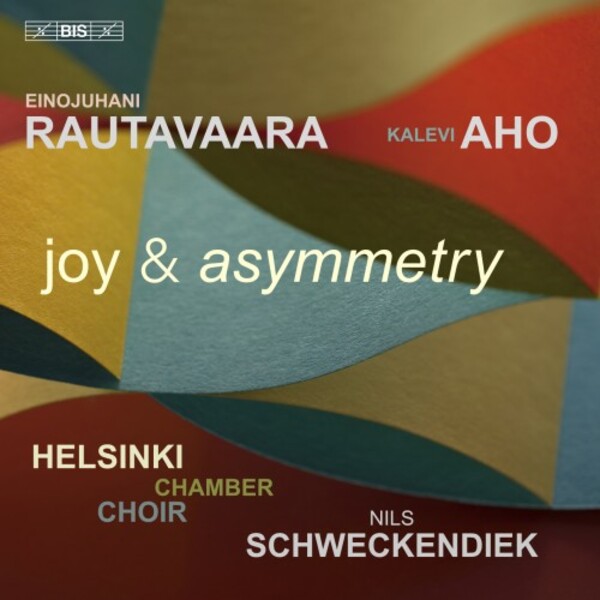AHO; RAUTAVAARA Joy and Asymmetry
View record and artist detailsRecord and Artist Details
Genre:
Vocal
Label: BIS
Magazine Review Date: 10/2024
Media Format: Super Audio CD
Media Runtime: 68
Mastering:
DDD
Catalogue Number: BIS2692

Tracks:
| Composition | Artist Credit |
|---|---|
| (Die) Erste Elegie |
Einojuhani Rautavaara, Composer
Helsinki Chamber Choir Nils Schweckendiek, Conductor |
| 3 Songs to Poems by Mawlana Rumi |
Kalevi Aho, Composer
Helsinki Chamber Choir Nils Schweckendiek, Conductor |
| Unsere Liebe |
Einojuhani Rautavaara, Composer
Helsinki Chamber Choir Nils Schweckendiek, Conductor |
| Joy and Asymmetry |
Kalevi Aho, Composer
Helsinki Chamber Choir Nils Schweckendiek, Conductor |
| Ave Maria |
Einojuhani Rautavaara, Composer
Helsinki Chamber Choir Nils Schweckendiek, Conductor |
| Book of Life, 'Elämän Kirja' |
Einojuhani Rautavaara, Composer
Helsinki Chamber Choir Nils Schweckendiek, Conductor |
Author: Andrew Mellor
Teacher and pupil Einojuhani Rautavaara and Kalevi Aho sit well together, not least as each tempered stringent formal principles with a more fantastical (Rautavaara) or linear (Aho) impulse. Rautavaara’s 1957 setting of the Ave Maria shows in miniature where his music might have gone: it’s a shapely but sobering piece of polyphony on a tone row. His Rilke setting The First Elegy (1993) reminds us where it went: still using a tone row but putting it in service of an angelic elegy that glows and soars.
To my ears, that piece reaches a level of ecstasy and rhapsody the rest of the album fails to muster thereafter, its position as the opening track only reinforcing the point. You might conclude that an album titled ‘Joy and Asymmetry’, offering snapshots of these two composers in a cappella mode, has insufficient joy and asymmetry of the kind that’s most satisfying on paper. Aho’s Three Songs to Poems by Mawlana Rumi bring love and harmonic imagination to the table but can still feel a little standoffish and are evidently an unforgiving sing, as the Helsinki Chamber Choir reveal in No 3, ‘Die!’.
Aho’s titular Joy and Asymmetry, continuously setting seven Mirkka Rekola poems, uses a chattering choral texture underneath a longer lyrical line at least once, but its position on this album right after Rautavaara has done the same in ‘The Letter’, the third of his four songs Our Love, suggests the technique is hackneyed (though the second song, ‘Then, that night’, has something to it). I find it hard to listen to Rautavaara’s ‘Song of Myself’, the last of his multilingual cycle A Book of Life (this setting Walt Whitman’s poem of the same name), and not think its syllabic text-setting ponderous – though again, its predecessor ‘The chair stood’ has something to it.
The tone of Nils Schweckendiek’s Helsinki Chamber Choir can curdle towards the top, although its strong bones reveal its origins as Finland’s professional radio choir. Despite there being little else wrong there, or with much of the music here, I wonder if and when I’ll have the inclination to listen again.
Discover the world's largest classical music catalogue with Presto Music.

Gramophone Digital Club
- Digital Edition
- Digital Archive
- Reviews Database
- Full website access
From £8.75 / month
Subscribe
Gramophone Full Club
- Print Edition
- Digital Edition
- Digital Archive
- Reviews Database
- Full website access
From £11.00 / month
Subscribe
If you are a library, university or other organisation that would be interested in an institutional subscription to Gramophone please click here for further information.




